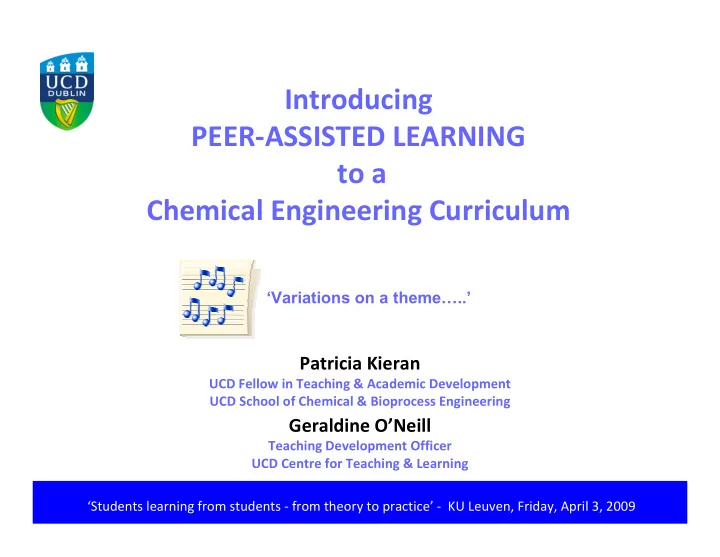

Introducing PEER-ASSISTED LEARNING to a Chemical Engineering Curriculum �������������������������� Patricia Kieran UCD Fellow in Teaching & Academic Development UCD School of Chemical & Bioprocess Engineering Geraldine O’Neill Teaching Development Officer UCD Centre for Teaching & Learning ‘Students learning from students - from theory to practice’ - KU Leuven, Friday, April 3, 2009
��� Kieran & O’Neill, UCD 2/18
Chemical & Bioprocess Engineering at UCD � 4-year (8 semester) degree programme � typically 35-40 graduates � accredited � Engineers Ireland � IChemE (MEng level) � strong emphasis on development of problem-solving skills & effective team work � preparation for professional life � Stage 2 Problem-based learning (PBL) project � Stage 4 Capstone Design Project (15-credits) Kieran & O’Neill, UCD 3/18
Framework for PAL CHEN30020 Unit Operations � 5-credit compulsory, lecture-based module � Traditionally, 36 x 50-minute lectures per semester � Principles & analysis of Chemical Engineering separation processes (e.g. Distillation, Evaporation, Liquid-Liquid Extraction, Gas Absorption, Drying, ……) Kieran & O’Neill, UCD 4/18
Why Peer-Assisted Learning? PRIMARY OBJECTIVE Develop student confidence in independently applying relevant principles � � Worked solutions to exam questions? � � Homework assignments? � � Tutorials? � � � � � Peer Assisted Tutorials? Kieran & O’Neill, UCD 5/18
Peer-Assisted Tutorials � Supportive environment for promoting active and independent student learning � Focus on application of relevant engineering principles in solution of relevant problems � Lead by Peer Tutors who have recently taken same module ���� Kieran & O’Neill, UCD 6/18
Comparing PAT & PAL PEER-ASSISTED LEARNING PEER-ASSISTED TUTORIALS � � Agenda set by students Agenda set by lecturer � � Content & outcomes Tutors update Lecturer on group confidential progress, problems � � Not compulsory Not compulsory, but marks awarded for attendance & participation � � Typically, no homework Homework assignments, to be undertaken individually, for each session Kieran & O’Neill, UCD 7/18
Developing Peer-Assisted Tutorials � September-October 2008 � Developed format for Tutorial systems � Group-Based Problem Solving Workshops for all Stage 4 students � Recruited tutors from Stage 4 class � Previously taken CHEN30020 (2007-08) � January-April 2009 � Tutor training (2.5 hr workshop) � Tutee introduction/training (1 hr workshop) � Weekly peer-assisted tutorials � Tutors paid (approx €12/hr) for tutorials � Brief weekly preparatory & review meetings with Tutors Kieran & O’Neill, UCD 8/18
Tutor Training � 2.5-hour workshop � Principles of Peer-Assisted Learning & Peer-Assisted Tutorials � Tutorial Structure � Tutor Role & Responsibilities � Supporting team in solving problems � Directed questioning � Techniques for silences! � Responsibilities & Expectations Kieran & O’Neill, UCD 9/18
Format of Typical PAT � 50-minute session � Peer Tutor assigned to group of 5-6 students � Assigned weekly homework problems, from course text book, exam-type questions � Each student brings homework to the PAT � 10% of module grade Attendance (3%) roll taken by Tutor Participation (3%) evaluated by Tutor (excellent/good/none) Homework (4%) evaluated by Post-Grad emphasis on individual effort in preparing for tutorial � Peer Tutor acts as session Chair � Assign roles to each team member (Reader, Scribe, Questioner, Evaluator, Timekeeper); roles rotate for each session � Two parts to each session Kieran & O’Neill, UCD 10/18
Typical Tutorial Group Process - Part 1: Pre-Assigned Problem - (15-20 min approx) Kieran & O’Neill, UCD 11/18
Typical Tutorial Group Process - Part 2: Introducing New Problem - (30-35 min approx) Kieran & O’Neill, UCD 12/18
Evaluation � Weekly feedback from Tutors � Feedback from Tutees � Informal � Focus Group � End-of-semester evaluation Kieran & O’Neill, UCD 13/18
And is it working????? For the Tutees….. ���������������������������������������������� ������������������������������������������ ����������������������������������������� ����� ����������������������������������������������� ��������������������������� ����������������� �������!���������� �������������!����"��������������#�������� Stage 3 students, working with their Tutors during a PAT March 2009 Kieran & O’Neill, UCD 14/18
And is it working????? For the Tutors…..Initial Teething Problems! ��������������������������������������� ���������������������������!������� ����������������������������������!������� ������� ������������������������!�������������� ���������������� “Please help me, Ms Martin! This wasn’t covered in my education course!!!!” Kieran & O’Neill, UCD 15/18
And is it working????? For the Tutors…..Evidence of Improvement! ��������������$����%���!������������������ �������������!������������������������������ ����������������������������� ����������������������������������������� �"���������������������������������� ���!�������������������������������� ������������ Stage 4 CHEN30020 Tutors March 2009 Kieran & O’Neill, UCD 16/18
For the Future….. � Development of module for 2009-10 “Peer Assisted Tutoring in Chemical Engineering” 5-credit elective module for Stage 4 students Tutors assigned to PAT group in TWO Stage 3 core modules Extension of training ‘Tutor journals’ � Similar initiatives planned for other UCD Engineering Schools Kieran & O’Neill, UCD 17/18
Acknowledgements ����������������� UCD Fellowships in Teaching & Academic Development UCD School of Chemical & Bioprocess Engineering UCD Centre for Teaching & Learning Prof Hugh Fleming, University of Bournemouth “We learn more by looking for the answer to a question and not finding it than we do from learning the answer itself” Lloyd Alexander Kieran & O’Neill, UCD 18/18
Recommend
More recommend